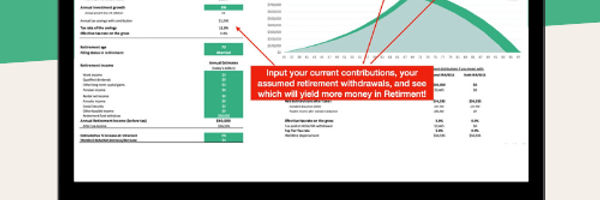Back in 2006, then President Bush signed a $70 billion tax cut provision that changed the eligibility rules for Roth IRA conversions. Starting in 2010, taxpayers with a modified adjusted gross income in excess of $100,000 can now convert a Traditional IRA into a Roth IRA. The easing of the income limit provided individuals planning for retirement with more freedom. But as we'll soon demonstrate, there are some significant disadvantages of Roth conversions too.
In this article, we're going to talk about the downside of Roth conversions. As part of that discussion, we'll first remind everyone why conversions are so popular. Next, we'll list some of the more important drawbacks to a Roth conversion and why converting is not always a good move for investors. Finally, we'll provide a short list of things to consider before converting a Traditional IRA to a Roth IRA.

Roth IRA or 401k? This template will answer your questions.
With this template, you will get:
All DFY, simply add your details
Charts for comparison and clear answer
Easily update for any year (2023, 2024, 2025, etc…)

Roth IRA Conversions
Additional Resources |
The Roth IRA is one of the most valuable investment options available to retirement planners today. While Traditional IRAs can offer tax deductions on contributions, the Roth IRA has some key advantages:
Age Limit for Contributions: while a Traditional IRA has an age limit on contributions; it's possible to contribute to a Roth IRA at any age.
Mandatory Distributions: while minimum distributions apply to Traditional IRAs starting at age 70 1/2; Roth IRA owners are never forced to take a distribution.
Taxing of Distributions: the growth of a Traditional IRA is tax-deferred, and when withdrawn, the growth portion is taxable just like ordinary income. Generally, all distributions from a Roth IRA are not taxed.
Retirement planners wishing to take advantage of the benefits of a Roth IRA often have the option of converting their Traditional IRA, but as mentioned at the start of this article, there are some significant disadvantages to Roth conversions too.
Disadvantages of Conversions
While it's easy to understand the benefits of conversions, it's easy to understand the downside of Roth IRAs too. There are many variations of the same theme that we'll talk about, but the primary problem with a conversion is income taxes. Converting Traditional IRA funds to a Roth IRA trades the tax deferred benefit of the Traditional IRA for the tax-free benefit of Roth withdrawals. Unfortunately, that tax-free benefit comes at a cost: the payment of income taxes in the near term.
When structuring Roth IRAs, policymakers allowed the holders of these retirement plans to withdraw all monies from that account on a tax-free basis, with the understanding that all money placed into a Roth account would be taxable income. This means that all growth of the account occurs on a tax-free basis, as long as all the money placed in the account is on an after-tax basis. This simple rule applies to conversions as well as contributions.
For contributions, this disadvantage is relatively painless because no tax liability is created. Excess income can be directed to a Roth IRA account and the contribution is not tax deductible. Conversions, on the other hand, can be burdensome. Money in the Traditional IRA that has not been taxed (growth in the account plus tax-deductible contributions) will be taxed when converted.
The entire conversion process creates several categories of disadvantages including:
Immediate Tax Burden: there are immediate tax implications to Roth conversions. For example, a taxpayer in the 28% tax bracket wishing to convert $10,000 of their tax-deductible Traditional IRA into a Roth IRA would generate a $10,000 x 28% or $2,800 income tax burden.
Income Tax Rate Shift: individuals that are not in the highest income tax bracket could be shifted to a higher one. Since the conversion dollars are treated as taxable income, a taxpayer in a 28% tax bracket could shift some of their income into the 33% rate.
Retirement Tax Brackets: many individuals will fall into a lower tax bracket when they retire, thereby counteracting some of the advantages of a Roth IRA.
Age / Retirement Income Needs: if the individual that is performing the conversion is close to retirement, AND they are likely to start withdrawing Roth funds soon after retiring, then the conversion might not provide any financial benefit. A rule of thumb is that it takes between 15 to 20 years for the tax-free growth of the Roth to overcome the disadvantage of the conversion's short term tax burden.
Information to Consider Before Converting
Finally, we'll provide a short list of factors to consider before converting. Even after thoughtful research, it's always a good idea to seek the help of a qualified tax professional. Roth conversions can result in a significant amount of taxes due to the federal government. Talking to a tax professional prior to a conversion can avoid a recharacterization of the IRA later on.
With that warning in mind, here are some key considerations before converting a Traditional IRA to a Roth IRA:
Investment Outlook: anyone planning to convert should have a long-term need for the money. Depending on an individual's present and projected tax status, it can take as long as 20 years for the conversion to be a breakeven effort.
Heirs: there are no minimum distributions at age 70 1/2 with a Roth IRA. If the income from a Traditional IRA isn't needed, then a Roth can be inherited on a tax-free basis.
Tax Burden: cash will be needed to pay the income taxes owed on a conversion. This is an especially important factor for individuals that do not have adequate emergency funds.
About the Author - The Disadvantages of Roth Conversions



.jpg)
.jpg)